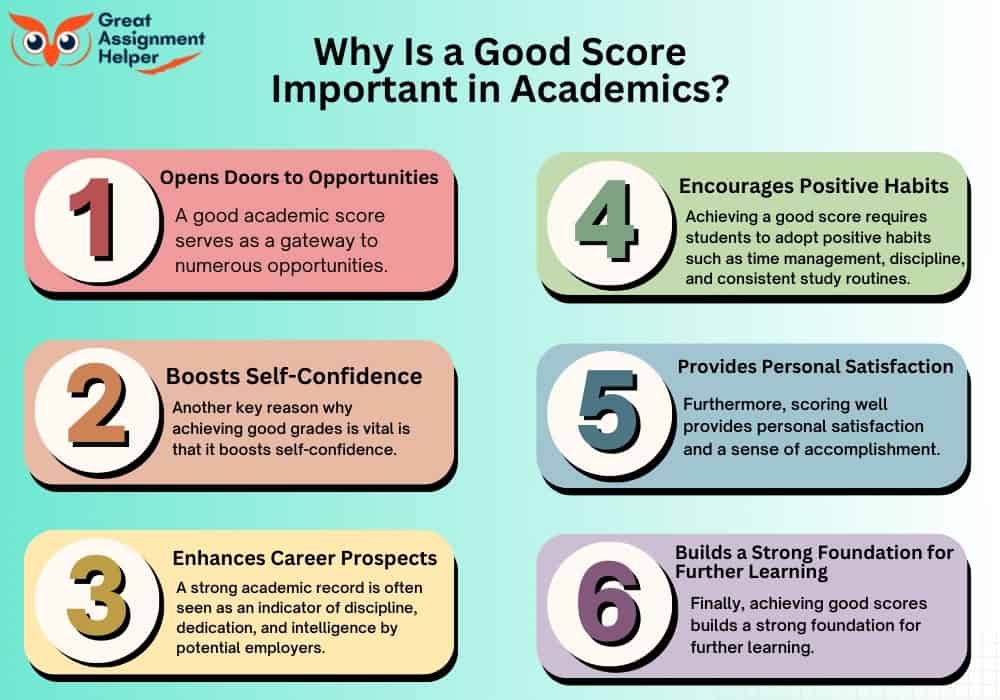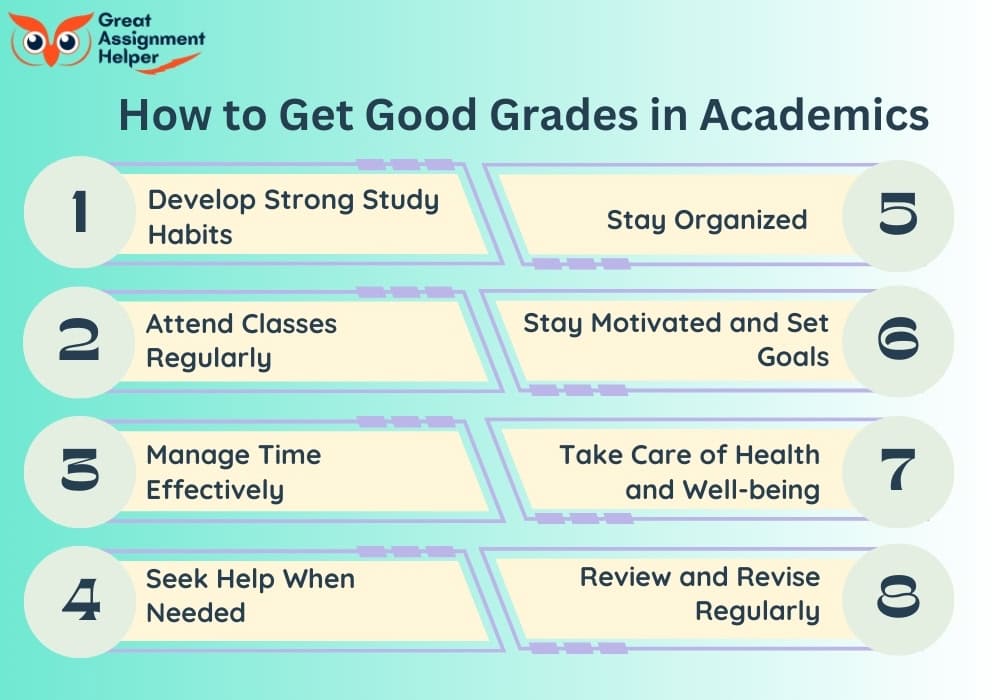
Hey there! So, you wanna know the secret sauce to scoring those shiny A's and B's? Hold on tight because I'm about to reveal some secrets. Picture this: you, sitting in class, acing every test that comes your way, impressing your teachers, and feeling like a scholarly superstar. Sounds pretty awesome, right? Trust me, it's totally achievable. Now, let me be real with you. Getting good grades isn't just about burying your nose in textbooks 24/7 (thank goodness, right?). It's about finding that perfect balance between studying smart and, well, actually enjoying life. Yep, you heard me right – good grades and a social life can totally coexist!
So, how do we make this magic happen? Stick around, because I'm about to share some killer tips and tricks that'll have you conquering those exams like a boss. From mastering the art of time management to finding your unique study style, we've got all the insider info you need to kick academic butt.
Get ready to say goodbye to those all-night cram sessions and hello to a GPA you can proudly show off. Trust me, with a little determination and a whole lot of strategy, you'll be well on your way to academic success. Let's do this!
Listen To This Blog
Why Is a Good Score Important in Academics?

From a student’s perspective, achieving a good score in academics is crucial for several reasons. It not only reflects their understanding of the subject matter but also plays a significant role in shaping their future. Below are key reasons highlighting why a good score is important.
1. Opens Doors to Opportunities
A good academic score serves as a gateway to numerous opportunities. Transitioning from high school to college or seeking scholarships becomes smoother with strong academic performance. For instance, many prestigious universities and scholarship programs require excellent grades as a minimum criterion, which emphasizes the importance of excelling academically.
2. Boosts Self-Confidence
Another key reason why achieving good grades is vital is that it boosts self-confidence. When students perform well academically, it reinforces their belief in their abilities, leading to increased motivation and perseverance in their studies. As a result, they are more likely to take on challenging tasks and pursue their goals with determination.
3. Enhances Career Prospects
A strong academic record is often seen as an indicator of discipline, dedication, and intelligence by potential employers. Thus, securing good scores can significantly enhance career prospects. Notably, many employers consider academic performance as a deciding factor during the hiring process, particularly for fresh graduates entering the workforce.
4. Encourages Positive Habits
Achieving a good score requires students to adopt positive habits such as time management, discipline, and consistent study routines. These habits not only contribute to academic success but also prepare students for real-life challenges. Consequently, students who excel academically are often well-prepared to handle various aspects of their personal and professional lives.
5. Provides Personal Satisfaction
Furthermore, scoring well provides personal satisfaction and a sense of accomplishment. When students see the results of their hard work and dedication, it brings about a feeling of fulfillment. This satisfaction acts as a reward, motivating them to continue striving for excellence in their academic pursuits.
6. Builds a Strong Foundation for Further Learning
Finally, achieving good scores builds a strong foundation for further learning. By mastering the material and excelling in assessments, students develop a deeper understanding of the subject matter, which is essential for advanced studies. This solid foundation is crucial for academic and professional success in the long run.
In conclusion, from a student's perspective, securing a good score in academics is vital for opening doors to opportunities, boosting self-confidence, enhancing career prospects, encouraging positive habits, providing personal satisfaction, and building a strong foundation for further learning. Therefore, striving for academic excellence is not just about grades but also about preparing for a bright and successful future.
Possible Reasons for Poor Grades
From a student's perspective, poor grades can result from a variety of factors. Understanding these reasons is crucial for identifying and addressing the challenges that hinder academic success. Below are key reasons why students might experience poor grades.
Lack of Understanding
One of the most common reasons for poor grades is a lack of understanding of the subject matter. When students struggle to grasp key concepts, they are more likely to perform poorly on assessments, which impacts their overall academic performance. This lack of comprehension can arise from various issues, such as ineffective teaching methods, insufficient study time, or a mismatch between the student's learning style and the instructional approach. For example, some students may benefit from visual aids or hands-on experiences, while others might excel with auditory or verbal instruction. Furthermore, students who do not allocate enough time for reviewing and practicing the material may find themselves falling behind in class. To address this issue, it's important for students to seek help from teachers, tutors, or peers, and to adopt effective study strategies that align with their learning preferences, ensuring they develop a solid understanding of the subject matter.
Poor Time Management
Poor time management is another significant factor contributing to unsatisfactory grades. When students procrastinate or fail to allocate adequate time for studying and completing assignments, they often find themselves overwhelmed when exams or deadlines approach. This lack of planning can lead to rushed work, incomplete assignments, and inadequate preparation for tests, all of which negatively impact their academic performance.
Additionally, poor time management can result from distractions, such as excessive use of technology or social engagements, which further detract from study time. It's crucial for students to recognize the importance of setting priorities and creating a structured schedule to balance their academic responsibilities with other activities.
By developing effective time management skills, students can improve their focus, reduce stress, and ensure they have enough time to properly prepare for their coursework, ultimately enhancing their overall performance and achieving better grades.
Lack of Interest or Motivation
When students lack interest or motivation in a subject, engaging with the material and performing well can be challenging. This disinterest might stem from various factors, such as a perceived lack of relevance to their personal goals or uninspiring teaching methods. For example, if a student doesn't see how a subject aligns with their future ambitions, they might struggle to find the drive to invest time and effort into studying it.
Additionally, teaching methods that fail to capture a student's attention or cater to their learning style can further dampen their enthusiasm. As a result, their grades may reflect this lack of engagement, often manifesting as lower performance or inconsistent results.
To combat this issue, it's important for students to find connections between the material and their interests or seek out different learning approaches that resonate with them, enhancing their motivation and overall academic performance.
External Distractions
External distractions, such as personal issues, social commitments, or excessive use of technology, can significantly hinder academic performance. When students are preoccupied with these distractions, they may find it challenging to focus on their studies, leading to poor grades. For example, students dealing with personal problems, such as family conflicts or relationship issues, may struggle to concentrate on their schoolwork, resulting in lower performance.
Similarly, students who prioritize social engagements or spend excessive time on their devices might neglect their academic responsibilities, leading to incomplete assignments or inadequate exam preparation.
Managing these distractions is vital for academic success. By establishing clear priorities, setting boundaries, and creating a conducive study environment, students can minimize interruptions and focus on their academic goals. Additionally, developing healthy coping mechanisms for personal issues and practicing time management can help students balance their academic and personal lives, ultimately leading to improved performance.
Inadequate Study Skills
Inadequate study skills can significantly impact academic performance. When students lack effective strategies for retaining information or tackling assignments, they are likely to struggle with exams and coursework. For example, students who do not employ techniques such as summarizing, note-taking, or active recall may find it challenging to remember key concepts during assessments.
Furthermore, inadequate study habits, such as cramming at the last minute or failing to review material regularly, can hinder academic success. These issues often result from not knowing how to approach studying effectively, which can lead to frustration and poor grades.
Developing strong study skills is crucial for achieving good grades. This involves not only mastering effective study techniques but also creating a structured study routine and seeking help when needed. By learning how to study effectively, students can enhance their understanding of the material, improve their retention, and ultimately perform better academically.
Health Issues
Health issues, whether physical or mental, can significantly impact academic performance. Students dealing with illnesses, stress, or mental health challenges may struggle to concentrate on their studies or attend classes regularly, leading to poor grades. For example, students experiencing chronic pain or anxiety may find it challenging to focus during lessons or exams. Similarly, mental health issues like depression can diminish motivation and energy, making it difficult for students to complete assignments or participate in class. Addressing these health issues, through medical support, therapy, or self-care, is crucial for students to improve their academic outcomes and overall well-being.
Lack of Support
A lack of support from teachers, family, or peers can hinder academic success. When students do not receive the guidance or encouragement they need, they may struggle to stay motivated or understand the material, leading to poor grades. For instance, without helpful feedback from teachers, students may not know how to improve their performance. Similarly, if family members or peers do not offer encouragement or assistance, students might feel isolated or overwhelmed by their studies. Establishing a supportive environment where students can seek help and feel encouraged is crucial for their academic performance and overall well-being.
Overcommitment
Overcommitting to extracurricular activities or part-time jobs can lead to poor grades. When students spread themselves too thin, they may not have enough time or energy to dedicate to their academic responsibilities, resulting in lower performance. For example, a student involved in multiple clubs or working long hours might find it challenging to complete assignments or study for exams. This lack of balance can cause stress and burnout, further affecting academic performance. Prioritizing commitments and managing time effectively is crucial for students to maintain a healthy balance between their activities and academic obligations, ultimately leading to better grades and well-being.
from a student's perspective, poor grades can stem from a variety of reasons, including a lack of understanding, poor time management, lack of interest, external distractions, inadequate study skills, health issues, lack of support, and overcommitment. By identifying and addressing these challenges, students can improve their academic performance and work towards achieving better grades.Top of Form
How to Get Good Grades in Academics

From a student's perspective, achieving good grades in academics is crucial for future success and personal satisfaction. To excel in school, students can employ several effective strategies. Below are key tips on how to get good grades.
1. Develop Strong Study Habits
One of the most important steps to achieving good grades is developing strong study habits. Setting aside regular time for studying, creating a conducive study environment, and using effective techniques, such as summarizing and active recall, can enhance understanding and retention of the material. Consistent study routines help students stay on top of their coursework.
2. Attend Classes Regularly
Attending classes regularly is crucial for academic success. By being present, students can absorb key information, participate in discussions, and clarify doubts. Additionally, regular attendance helps students stay engaged and up-to-date with assignments and exams, contributing to better grades.
3. Manage Time Effectively
Effective time management is another key factor in getting good grades. Creating a study schedule, setting priorities, and avoiding procrastination can help students balance their academic responsibilities with other commitments. By managing time wisely, students can ensure they have ample time for studying and completing assignments.
4. Seek Help When Needed
Seeking help when needed is vital for academic success. If students struggle to understand a concept or complete an assignment, they should not hesitate to ask for assistance from teachers, tutors, or classmates. This proactive approach ensures that students address their challenges early, preventing poor performance.
5. Stay Organized
Staying organized is essential for keeping track of assignments, exams, and important deadlines. Using planners, calendars, or digital tools can help students stay organized and prepared, reducing stress and improving academic performance. Organization fosters a structured approach to schoolwork.
6. Stay Motivated and Set Goals
Staying motivated and setting goals can drive academic success. By identifying personal or academic objectives, students can stay focused and committed to their studies. Setting realistic and achievable goals helps maintain motivation, which is crucial for achieving good grades.
7. Take Care of Health and Well-being
Taking care of health and well-being is crucial for academic success. Eating nutritious meals, getting enough sleep, and managing stress through exercise or relaxation techniques can improve focus and concentration. A sound mind and body enhance academic performance.
Top of Form
8. Review and Revise Regularly
Regularly reviewing and revising material helps reinforce learning and prepares students for exams. By consistently revisiting key concepts and practicing problems, students can identify gaps in their understanding and address them before assessments. This proactive approach leads to better grades.
In conclusion, from a student's perspective, getting good grades requires strong study habits, regular class attendance, effective time management, seeking help, staying organized, staying motivated, taking care of health, and regularly reviewing material. By following these tips, students can improve their academic performance and achieve success in their studies.
Conclusion
In conclusion, achieving good grades in academics is essential for students as it opens doors to future opportunities and fosters personal growth. By developing strong study habits, attending classes regularly, managing time effectively, seeking help when needed, staying organized, staying motivated, taking care of health, and regularly reviewing material, students can improve their academic performance.
Furthermore, utilizing reliable assignment helpers like GreatAssignmentHelper can provide additional support, helping students tackle challenging assignments and maintain high grades. By adopting these strategies and leveraging available resources, students can excel academically and set themselves up for future success.

